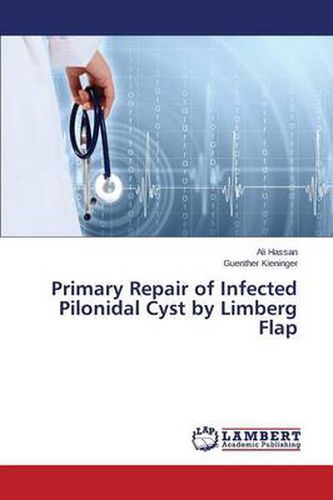Readings Newsletter
Become a Readings Member to make your shopping experience even easier.
Sign in or sign up for free!
You’re not far away from qualifying for FREE standard shipping within Australia
You’ve qualified for FREE standard shipping within Australia
The cart is loading…






This title is printed to order. This book may have been self-published. If so, we cannot guarantee the quality of the content. In the main most books will have gone through the editing process however some may not. We therefore suggest that you be aware of this before ordering this book. If in doubt check either the author or publisher’s details as we are unable to accept any returns unless they are faulty. Please contact us if you have any questions.
Surgical treatment of pilonidal cyst carries a wide spectrum of procedures and a considerable risk of complications, recurrence and cosmetic sequelae. We present our experience with the rotational flap plasty(limberg-plasty) as a treatment modality for pilonidal disease. From June 2006 till May 2013 we treated at our hospital 100patients with pilonidal disease. 9 out of them were treated with open technique (excision and secondary healing). The remaining 91 were treated by excision and primary closure according to the Limberg technique. 20 chronic cases without acute abscess formation.the rest with acute abscess = treated with primary limberg plasty. Septo-coll sponge applied.drain inserted for 48 hours. Antibiotics given for 7 days. Patients were discharged after 2 days and came for follow up every 4 days. stitches removed after 14 days. The post operative follow up was uneventful. Pain scale less than 2. Patients could manage their normal life from day 2 on and go to normal work after 2 -3 weeks. Limberg flap should be considered as the gold standard for the treatment of pilonidal disease both chronic and acute.
$9.00 standard shipping within Australia
FREE standard shipping within Australia for orders over $100.00
Express & International shipping calculated at checkout
This title is printed to order. This book may have been self-published. If so, we cannot guarantee the quality of the content. In the main most books will have gone through the editing process however some may not. We therefore suggest that you be aware of this before ordering this book. If in doubt check either the author or publisher’s details as we are unable to accept any returns unless they are faulty. Please contact us if you have any questions.
Surgical treatment of pilonidal cyst carries a wide spectrum of procedures and a considerable risk of complications, recurrence and cosmetic sequelae. We present our experience with the rotational flap plasty(limberg-plasty) as a treatment modality for pilonidal disease. From June 2006 till May 2013 we treated at our hospital 100patients with pilonidal disease. 9 out of them were treated with open technique (excision and secondary healing). The remaining 91 were treated by excision and primary closure according to the Limberg technique. 20 chronic cases without acute abscess formation.the rest with acute abscess = treated with primary limberg plasty. Septo-coll sponge applied.drain inserted for 48 hours. Antibiotics given for 7 days. Patients were discharged after 2 days and came for follow up every 4 days. stitches removed after 14 days. The post operative follow up was uneventful. Pain scale less than 2. Patients could manage their normal life from day 2 on and go to normal work after 2 -3 weeks. Limberg flap should be considered as the gold standard for the treatment of pilonidal disease both chronic and acute.